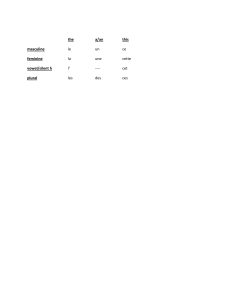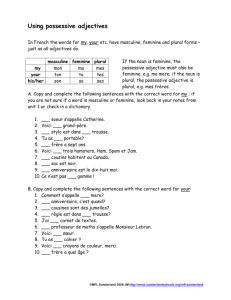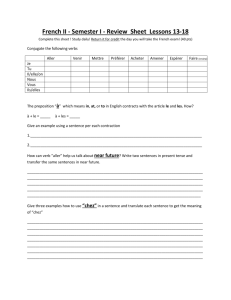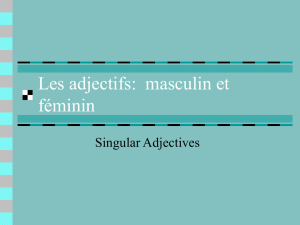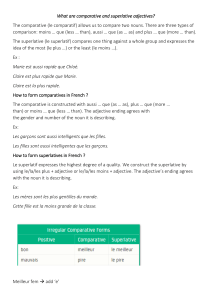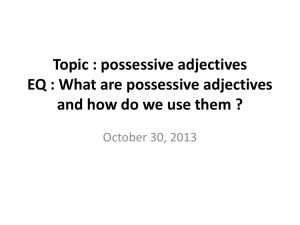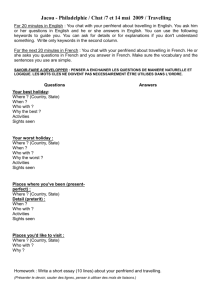ADJECTIVES 1. An adjective describes something. There are lots of
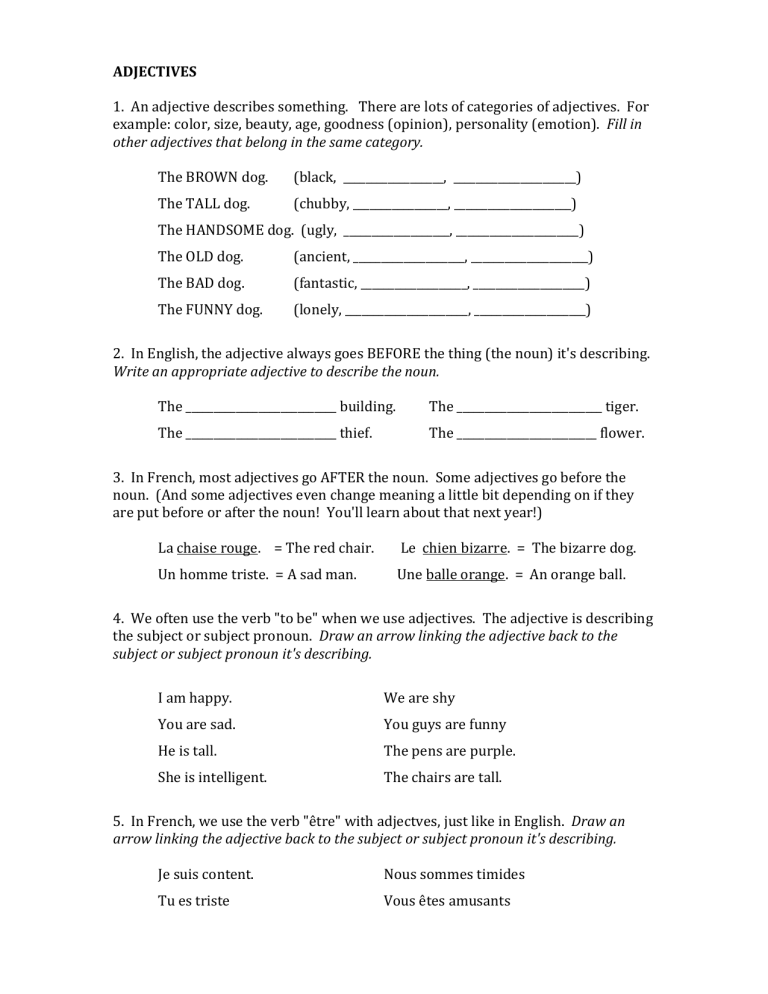
ADJECTIVES
1. An adjective describes something. There are lots of categories of adjectives. For example: color, size, beauty, age, goodness (opinion), personality (emotion). Fill in other adjectives that belong in the same category.
The BROWN dog. (black, __________________, ______________________)
The TALL dog. (chubby, _________________, _____________________)
The HANDSOME dog. (ugly, ___________________, ______________________)
The OLD dog.
The BAD dog.
(ancient, ____________________, _____________________)
(fantastic, ___________________, ____________________)
The FUNNY dog. (lonely, ______________________, ____________________)
2. In English, the adjective always goes BEFORE the thing (the noun) it's describing.
Write an appropriate adjective to describe the noun.
The ___________________________ building. The __________________________ tiger.
The ___________________________ thief. The _________________________ flower.
3. In French, most adjectives go AFTER the noun. Some adjectives go before the noun. (And some adjectives even change meaning a little bit depending on if they are put before or after the noun! You'll learn about that next year!)
La chaise rouge. = The red chair. Le chien bizarre. = The bizarre dog.
Un homme triste. = A sad man. Une balle orange. = An orange ball.
4. We often use the verb "to be" when we use adjectives. The adjective is describing the subject or subject pronoun. Draw an arrow linking the adjective back to the subject or subject pronoun it's describing.
I am happy. We are shy
You are sad. You guys are funny
He is tall.
She is intelligent.
The pens are purple.
The chairs are tall.
5. In French, we use the verb "être" with adjectves, just like in English. Draw an arrow linking the adjective back to the subject or subject pronoun it's describing.
Je suis content. Nous sommes timides
Tu es triste Vous êtes amusants
Il est grand.
Elle est intelligente.
Les stylos sont violets.
Les chaises sont grandes.
6. In French, the adjective has to “AGREE WITH” the thing or person you are describing. This means you will use a different form of the adjective depending on if what you are describing is masculine or feminine, and whether it is singular or plural. Write down, in words that make sense to you, what "agreement" means.
_____________________________________________________________________________________________
_____________________________________________________________________________________________
______________________________________________________________________________________________
7. Here are some masculine things. You know they are masculine because the words UN (a or an) and LE (the) indicate a masculine noun. Circle and translate the little words that help you identify whether a noun is masculine. un livre, un garçon, un bureau, le téléphone, le stylo, le crayon.
8. Here are some feminine things. You know they are feminine because the words
UNE (a or an) and LA (the) indicate a feminine noun. Circle and translate the little
words that help you identify whether a noun is feminine. une glace, une fille, une télévision, la table, la balle, la banane.
9. Here are some plural things. You know they are plural because they have an "s" or "x" at the end. Also, the words DES (some) and LES (the) indicate that there is more than one. You need to memorize whether a noun is masculine or feminine.
Write M for masculine and F for feminine next to these plural nouns.
______des glaces, _____ des livres, _____ des garçons, _____les stylos , _____ des filles,
_____des télévisions, _____les crayons, _____les tables, _____les balles, _____des bureaux
10. AGREEMENT means that you use a masculine form of the adjective if the thing you are describing is masculine. And you use a feminine form of the adjective if the thing you are describing is feminine. And you use a plural form if the thing you are describing is plural. In French, the adjective MUST agree in gender (masculine or feiminine) and in number (singular or plural) In the space below, write down, in words that make sense to you, what "agreement" means.
_____________________________________________________________________________________________
_____________________________________________________________________________________________
11. In French, we first learn what the “base form” of the adjective is. The "base form" of the adjective is the masculine, singular form. Then we learn the feminine and plural forms. Rewrite the base form of the adjective.
Le garçon est intelligent. _________________________
Il y a un chien fâché. ____________________________
12. We have to learn the feminine endings in order for the adjective to properly agree with a feminine noun or subject that the adjective is describing. Rewrite the
feminine form of the adjective.
La fille est intelligente _______________________________
Il y a une giraffe fâchée. _________________________________
13. Usually the plural form has an "s". Rewrite the plural form of the adjective.
Les garçons sont intelligents . ______________________________
Il y a des chiens fâchés. ______________________________________
Les filles sont intelligentes _________________________________
Il y a des giraffes fâchées. _____________________________________
15. Complete these sentences using adjectives. Make sure they "agree in gender
(masculine or femine) and number (singular or plural)."
Le chien est ____________________ et ____________________________.
La giraffe est ____________________ et _____________________________.
Les chiens sont ______________________ et _________________________.
Les giraffes sont _____________________ et __________________________
14. Here are some French adjectives that you already know. You must memorize how to spell them. Start with the base form, then learn the feminine and plural endings. Rewrite the full feminine forms. Write the translation too if you need it. grand /e __________________________ petit/e ________________________ content/e ________________________ intelligent /e ________________________ laid /e ________________________ créatif /ive ________________________ fort / e ___________________________ sportif /ive ________________________
sérieux /euse _______________________ généreux /euse ________________________ fâché /e ________________________ beau* / belle ________________________ fatigué /e ________________________ gros* /se ________________________
(*plural of beau is beaux; plural of gros is gros)
15. There are many adjectives that end in an "e". This is both the masculine and feminine form. You don't make changes unless you need to make it plural. Write the
translation of these adjectives. bizarre ________________________ stupide ________________________ malade timide
_________________________
________________________ triste mince
________________________
________________________
16. Partner work. a- quiz each other on the adjectives. Tell your partner the English word; your partner writes it on a white board and then spells it for you in French; you correct. Then switch. b- Write two descriptions, one of a famous male and one of a famous female person or character. You and your partner discuss the description but you both write it out in the space below.
